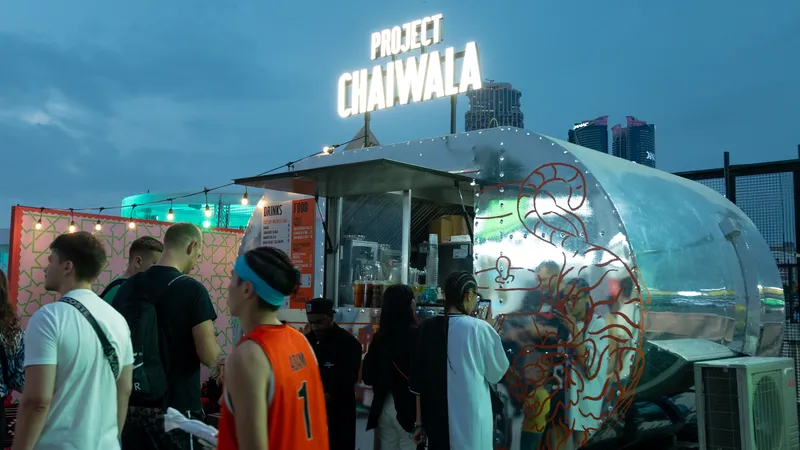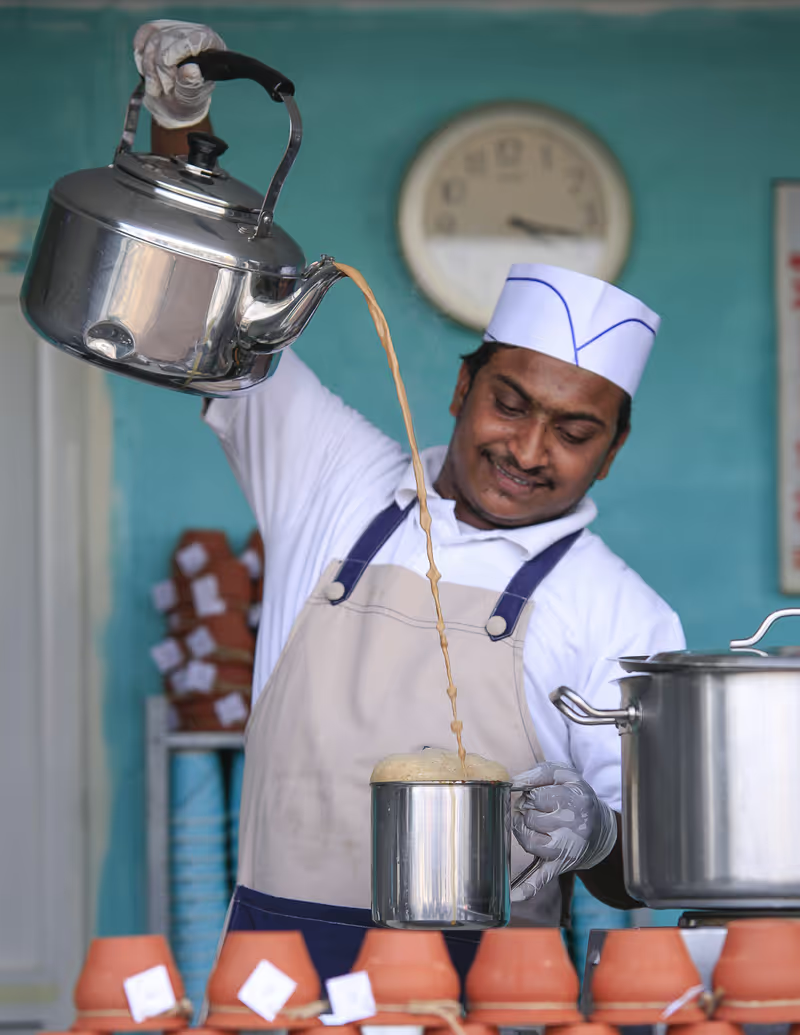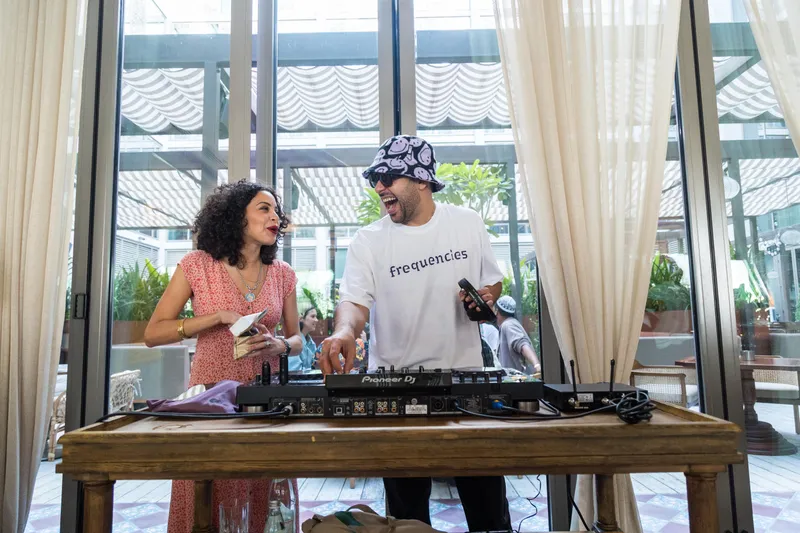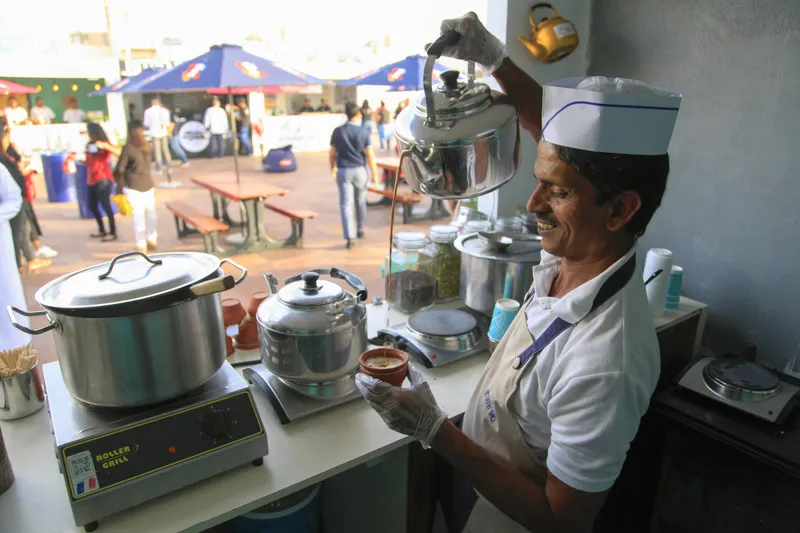Project Chaiwala’s vision to serve the world a cup of karak
Ahmed Kazim and Justin Joseph started Project Chaiwala in 2017—a homegrown multi-chain tea concept. Inspired by the Middle East’s and India’s chai culture, the duo aims to modernise the karak experience.
It has been a long day at work. You just finished another meeting and stepped out for a break with your colleague. Somehow—without exchanging a word—you both know it's time for tea.
After a few steps and a sniff here and there, you reach the footsteps of your favourite break shop—a karak stall, serving up a strong cup of caramel-hued tea.
Through bustling streets, a buoyant workplace, the worn-out work friends, and the occasional drowsy pedestrian, karak binds all. For some, the needful, for others, a mellow pause.
Just like India, the United Arab Emirates (UAE) also shares the bond of a strong cup of tea or chai. The region has fostered this tea-loving culture since the mid 90s and with time, chai concepts have evolved taking on an urban approach. Among them, brewing with activity in Dubai is .

Project Chaiwala
Ex-financial consultants, Ahmed Kazim and Justin Joseph, grew up among Dubai’s chai enthusiasts.
“Both of us grew up with chai, but differently. I am a UAE national; Justin is an Indian raised in Dubai. I am sure our paths have crossed in the same places, but different times, I guess,” says Kazim.
Sipping a cup of tea, Kazim shares, “When you are young, the moment an older friend has a driving licence, you jump in a car and go grab chai. That is exactly how it is.”
Serving the perfect cup of karak
“Justin and I came from two different cultures that interlinked somehow, and we said – how can we translate that into an experience for everyone else,” says Kazim, who started Project Chaiwala with Joseph nearly 7 years ago.
While work first brought the two together, they would hang out during breaks. “It was very coincidental. We used to discuss business ideas and then we stumbled upon tea and began exploring it,” Kazim tells YourStory Gulf Edition.
The two decided they needed to understand tea and its surrounding culture. Eventually they reached the foothills of tea gardens in India and Sri Lanka. Upon returning, they began with pop-up experiences at different events across Dubai. This perfectly fit with the aim of making karak an “out-of-home experience”.

Project Chaiwala
Project Chaiwala has come miles ahead of its temporary setup. It has now grown into a multi cafe chain, with three cafes across Dubai located at Cinema Akil, Alserkal Avenue; Ibn Battuta Mall; and the head office of Emirates NBD.
The duo also takes part in events throughout the country. “We activate our carts at private events, catering and weddings,” says Kazim. As for the cafes, he describes them as vibrant and theatrical—complete with shades of orange, turquoise, and brown, which set the foundation for the project’s overall theme.
Adapting to change
While the pandemic brought the world to a halt and forced the world indoors, for businesses in the food and beverage space this meant looking beyond existing limitations.
Like many other restaurants operating in the UAE, Project Chaiwala too moved online. As per an analysis by the Dubai Chamber, online sales within the UAE’s F&B market surged 255% year-over-year in 2020 to reach $412 million.
At the time, it decided to launch home-brewing kits and DIY kits. “You adapt and you move on... That is what we did,” said Karim.
Besides the home-brewing kits, it also launched Karak Groove Sessions—a space to bring together tea lovers over music. “This started as a digital initiative during Covid-19 and made into a live event thereon,” says Kazim. These monthly live events are held even now.

Karak Groove Session
The offerings today
For the most part, the pandemic after effects have remained in the food and beverage sector. The value of online food and beverage sales in the country is expected to reach $619 million by 2025, registering a compound annual growth (CAGR) of 8.5 % between 2020-25.
“The outlets were shut for a short while but bit by bit we started opening up. During the lockdown period, we focused on delivery and simultaneously launched the tests of the consumer packaged goods,” said Karim.
At the moment, Project Chaiwala competes with the likes of Filli Cafe—which has been around since 2004—and Cha Cha Chai—which was launched in 2013.
Its outlets are inspired by the spirited street culture—the highlight of which is the chaiwala brewing karak. All of this is set in the midst of an artsy, comforting, and urban experience—an aesthetic that appeals to young patrons, the target audience for the firm.

Project Chaiwala
Beverages are served in paper cups as well as clay cups sourced from India, says Kazim.
Project Chaiwalla’s menu can be ordered through delivery partners Deliveroo, Talabat, and Careem, besides its own outlets.
Future roadmap
In January this year, the team partnered with fashion and lifestyle retail conglomerate Apparel Group. The partnership will facilitate the concept’s nation-wide expansion and its transformation into a global omnichannel tea company.
Apparel Group will also explore refurbishments, marked by a novel look and store concept at Project Chaiwala's flagship locations.
In the near future, the menu is set to include limited-edition products as well as merchandise collaborations with other lifestyle brands.
Besides this, there are plans to introduce a business-to-business (B2B) offering comprising a proprietary chai brewing machine, and more.
“Down the line, we will be working on specific blends for specific occasions. Let's say, if it's women's month, we might source from a woman-run tea garden. That’s the plan.” adds Kazim.
“Go big or go home; that is what it is,” he concludes.
Disclaimer: This story was updated to correct a typo.
For any press related queries or to share your press releases, write to us at
[email protected].
Edited by Akanksha Sarma







